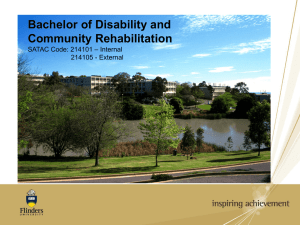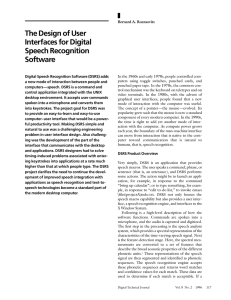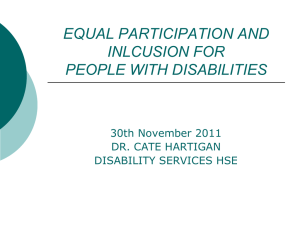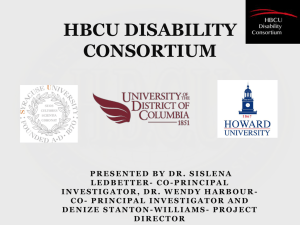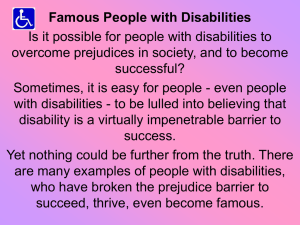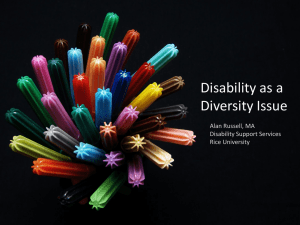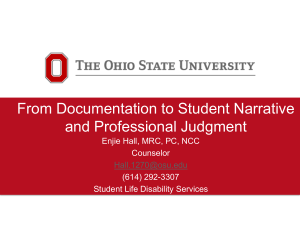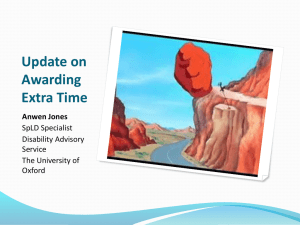Bachelor of Disability and Developmental Education
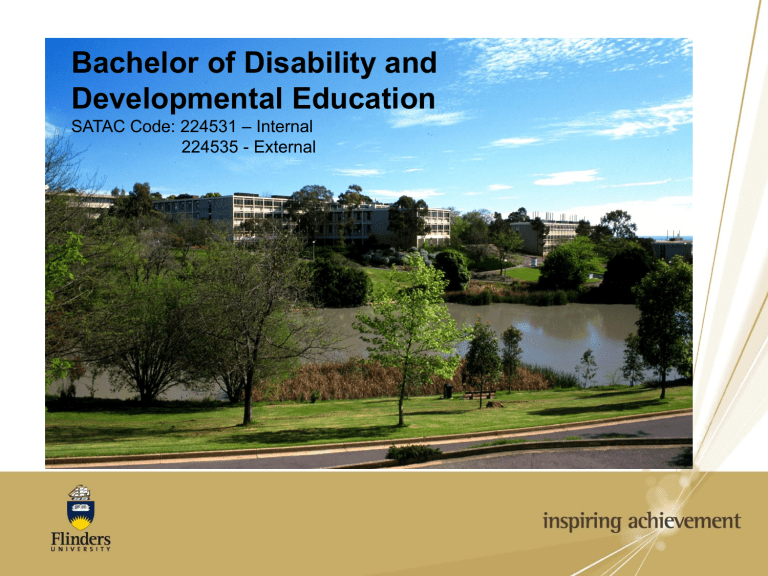
Bachelor of Disability and
Developmental Education
SATAC Code: 224531
– Internal
224535 - External
Why Study the BDDE at Flinders?
• Will prepare you for a rewarding career that allows you to make important differences in people
’ s lives.
• Usually leads to job offers even before you graduate.
• Is multidisciplinary in content, with contributions from psychology, philosophy, sociology, health, rehabilitation and special education.
• Allows you to develop specialist human service skills.
• Join a progressive group of academics who work hard to support the quality of life, community inclusion and selfdetermination of all people with disabilities and their families.
• Be involved in teaching, research, community service, demonstration, evaluation and dissemination activities.
• Gain real experiences in University based Demonstration
Projects: Disability Advisory Support Service, Community
Re-entry Project, Up the Hill Project.
Entry Requirements
•
Year 12 ATAR (TER) for 2011:
•
Internal - 60.9
•
External - 64.1
•
Tertiary Transfer/STAT/TAFE/ Mid-Year Intake
•
•
Prerequisites
Nil
•
•
Assumed knowledge
Nil
• Semester 1
Course Content
First Year
• DSRS 1209 Human Diversity
• DSRS 1210 Interpersonal & Group Skills
• DSRS 1206 Health Issues & Disability
• DSRS 1215 Communication & Language
4.5
4.5
4.5
4.5
• Semester 2
• DSRS 1201 Perspectives of Disability & Rehabilitation 4.5
• DSRS 1202 Lifespan Development 4.5
• DSRS 1211 Introduction to Neurological Rehabilitation 4.5
• DSRS 1216 Introduction to Principles of Learning 4.5
• The course also requires that by the end of the first year of study students will have undertaken, a 40-hour voluntary placement in a relevant human service agency.
Course Content
Second Year
• Semester 1
• DSRS 2230 Mentoring & Advocacy 4.5
• DSRS 2231 Augmentative & Alternative Communication 4.5
• DSRS 2232 Practicum A –
Disability & Developmental Education 4.5
• DSRS 2233 Community Development & Funding 4.5
• Semester 2
• DSRS 2234 Direct Instruction
• DSRS2237 Employment & Disability
4.5
• DSRS 2235 Professional Ethics for Disability Practitioners 4.5
• DSRS 2236 Practicum B –
Disability & Developmental Education 4.5
4.5
Course Content
Third Year
• Semester 1
• DSRS 3220 Family Professional Partnerships 4.5
• DSRS 3221 Positive Behavioural Support
• DSRS 3222 Counselling
4.5
4.5
• HLTH 3102 Qualitative Methods in Social Health Research 4.5
• Semester 2
• DSRS 3233 Practicum C –
Disability & Developmental Education 9.0
• DSRS 3234 Case Management 4.5
• HLTH 3105 Quantitative Methods in Social Health Research 4.5
Course Content
Fourth Year
• Over the whole year, students are required to do at least one 4.5 unit
Practicum Specialisation topic and at least one 4.5 unit Independent Study
• The remainder of topics are chosen from elective Specialisation topics
• An example study pattern would be as follows:
• Semester 1
• DSRS 4100 Rehabilitation & Mental Health
• DSRS 4101 Leisure, Arts, & Disability
• DSRS 4104 Early Intervention & Play
• DSRS 4105 Independent Study 1
• Semester 2
• DSRS 4108 Applied Counselling
• DSRS 4109 Autism Spectrum Disorders
• DSRS 4114 Practicum Specialisation 3.
• DSRS 4111 Intellectual Disability
4.5
4.5
4.5
4.5
4.5
4.5
4.5
4.5
Specialisation Topics
Semester 1
• DSRS 4100 Rehabilitation & Mental Health
• DSRS 4101 Leisure, Arts and Disability
• DSRS 4102 Technological Applications and Disability
• DSRS 4103 Community Rehabilitation for people with ABI
• DSRS 4104 Early Intervention & Play
• DSRS 4105 Independent Study 1
• DSRS 4106 Practicum Specialisation 1
• DSRS 4107 Practicum Specialisation 2
Semester 2
• DSRS 4108 Applied Counselling
• DSRS 4109 Autism Spectrum Disorders
• DSRS 4110 Transition to Adult Life for people with disabilities
• DSRS 4111 Intellectual Disability
• DSRS 4113 Independent Study 2.
• DSRS 4114 Practicum Specialisation 3.
• DSRS 4115 Practicum Specialisation 4.
OR Other topics negotiated with the Course Coordinator
4.5
4.5
4.5
4.5
4.5
4.5
4.5
4.5
4.5
4.5
4.5
4.5
4.5
4.5
4.5
BDDE with Honours
• A student who has completed the first three years of the Bachelor of
Disability & Developmental Education may be accepted as a candidate for the Honours degree providing a sufficiently high standard has been achieved in fulfilling the requirements for the bachelor's degree.
• DSRS 5005 Foundations of Honours in Disability Research 9.0
• Specialisation (chosen from the previous list) 4.5
• DSRS 4105 Independent Study 1
• DSRS 5004 Honours Thesis
4.5
18.0
• This may be done full time or part time.
Related Courses
• Programs that articulate with Bachelor of Disability &
Developmental Education:
Bachelor of Health Science (a major in Disability is an option)
Bachelor of Behavioural Science (a major in Disability is an option)
Many other courses contain elective topics and students may choose to undertake Disability topics
The double degrees in Disability and Education started in 2011. This is administered by Education and you will need to seek advice there if interested.
Career Pathways
• Graduates of the BDDE are called
Developmental Educators (DEs)
• They work in a range of government and non government agencies
– Disability SA, Autism SA,
– Leveda, CARA, Novita, Anglicare,
– Child & Youth Health, Career Systems, Minda,
– Townshend house, Early Development Program,
Community Re-entry Program, and
– too many others to mention here.
Notes
• The topics in the BDDE may be undertaken in internal mode on campus or in external mode through flexible delivery.
• In order to benefit from face to face experience, external students undertake practica, attend intensives on campus and participate in live online discussions.
• Single day intensives on campus are required in
• DSRS1210 Interpersonal and Group Skills,
• DSRS2235 Professional Ethics for Disability Practitioners,
• DSRS3222 Counselling and
• DSRS3224 Case Management.
• School leavers are strongly encouraged to enrol for the internal course – studying externally
IS MORE DIFFICULT
How to contact us
• Admissions Office
(08) 8201 3074 admissions@flinders.edu.au
• Disability & Community Inclusion
(08) 8201 5221
Peggy.Kincaid@flinders.edu.au
• Flinders University website www.flinders.edu.au
• You can locate any staff member at Flinders University by going to the Flinders University Website and clicking on the Staff Directory link at the top
Registration and Relevant
Professional Associations
• While there is currently no registration/accreditation for
Developmental Educators, there has been much work on this and, hopefully, this will emerge in the future.
• Relevant Professional Associations
Australasian Disability Professionals http://adp.org.au/
Developmental Educators Association Inc.
http://www.deai.com.au/
